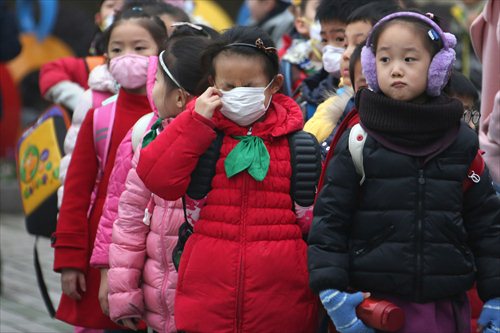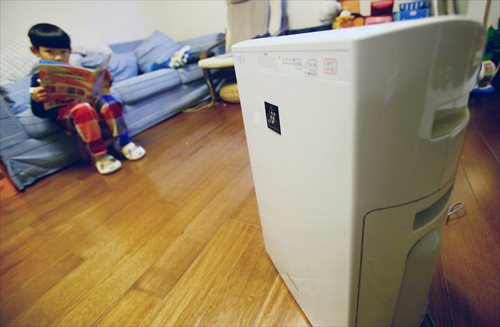HOME >> METRO SHANGHAI
City kindergartens battle to have air purifiers installed
By Ni Dandan Source:Global Times Published: 2016-1-11 17:58:01

Masks have been vital accessories on heavily polluted days. Photo: CFP
When the sunshine managed to penetrate through the layers of smog last Wednesday, toddlers at the Star Kindergarten in Pudong New Area were at last allowed to play outside. Thanks to the wind, the air quality index (AQI) in the city finally dropped below 100.
It has been a grim and funless winter for most children in the city - not just kindergarten kids but also primary, middle and high school students, who have not been allowed to leave their classrooms during breaks. In the past month alone, the city's education commission had issued at least four warnings advising schools to suspend outdoor activities for the day.
The outdoor bans were imposed when the city's air was seriously polluted - the AQI usually passed 200 on these days. On slightly polluted days when the index ranged between 100 and 200, some students were allowed normal outdoor activities but many conservative kindergartens still kept their children indoors.
In the past few weeks social networking platforms have been bubbling with reports of air pollution but more particularly, recently, with demands that the city's schools and kindergartens be provided with air purifiers which can eliminate PM2.5 particles.
Many of the city's households have already installed air purifiers - retailers have reported stocks have been sold out or decimated because of the demand. But while air purifiers can be provided for homes and offices, getting them into schools has been problematical.
A generous parent
The relatively new Star Kindergarten, a public kindergarten, last month accepted an air purifier that had been donated by a parent and installed it in the dormitory where 28 of its 4-year-olds take a nap in the afternoon. "We thought about fund raising but it took a lot of time coordinating all the parents and getting unanimous agreements from everyone. One mother felt it was too time-consuming so she paid for the entire bill on her own," Yang Anqi, the mother of one of the kindergarten students, told the Global Times.
"The kindergarten happily accepted the purifier. I think the teachers also welcomed it because it would benefit their health, too," the mother added.
But in most other city kindergartens this generous and healthy donation would have been rejected.
"Without approval from the city education commission, we cannot put air purifiers in our classrooms even if they have been donated by a parent or paid for by all the parents. All public kindergartens have to get approval from the education commission. None of us are excepted," explained one teacher from a Baoshan public kindergarten, who insisted on anonymity.
Earlier the parent of one of the kindergarten children had told the Global Times that their offer to provide an air purifier had been turned down without a reason given. "Fund raising for purifiers involving all the parents is really difficult. There are 20 toddlers in my son's class and three of the parents didn't want to pay 200 yuan ($30) for a purifier. We tried our best and talked them round but when we took the proposal to the kindergarten, they instantly knocked the idea back," said the father, adding that the school didn't even offer a reason.
"Is our children's health not important to them - what's more important?" he demanded angrily.
The same thing happened at another public kindergarten in Putuo district a month ago. Li Yinghua is the mother of a 5-year-old there and explained that parents hadn't asked the kindergarten to pay for the purifiers. "We just wanted them to take the purifiers and install them in the classrooms. They told us there were safety concerns and there was no precedent for this."
Li told the Global Times she was especially concerned about the effect that pollution could have on her daughter because she suffered from asthma. "We don't know what we're breathing in every day. And we don't know the extent air purifiers can help us. But at home I feel the air purifiers do freshen the air and let us sleep better," the mother said.
"I don't see why kindergartens are rejecting our donations. It's a lame excuse to blame the education commission for not issuing an order or something. A citywide survey could take ages to carry out."
But even worse, said Li, was that many kindergarten teachers didn't understand the harm polluted air could cause. She saw recently on WeChat a teacher sharing pictures of her class playing outside on a heavily polluted day. "It really drives me nuts seeing children playing in such a dirty environment. But you can't point this out to the teachers because they would just get angry with you. Even worse some of the parents don't see anything wrong here. They love seeing the pictures."
Strictures ignored
Some kindergartens appear to have ignored the official strictures. As well as the Star Kindergarten in Pudong, an experimental pubic kindergarten in Changning district that was established 25 years ago has installed air purifiers in its 20 classrooms.
The purifiers were bought in November 2014 and since then have been operated and maintained by kindergarten staff and the parents haven't paid a penny for them.
And although another private kindergarten in Yangpu district has also installed a purifier in a classroom that accommodates 20 under 3-year-olds, the principal didn't want the school identified. She said it was a delicate situation.
"Without approval from the education commission, the kindergarten purchased this purifier in the winter of 2014 for one of our classrooms. We felt these children were very fragile and could be badly affected by the environment," explained the principal Zhou Ling. Her kindergarten looks after more than 300 children.
However, without official approval, Zhou said she was worried she could be in trouble despite the fact that she had only good intention. "We open the windows for set times during the day and keep the purifiers on for hours throughout the classes. I don't know how much this helps or if it really helps at all but I have purifiers in my home and I believe these are now an indispensable part of life in Shanghai given the realities."
Regarding the safety concerns some kindergartens cited for not installing air purifiers, Zhou said the appliances had child lock devices and all the electrical connections were fitted at least 1.6 meters above the ground.
While Zhou's kindergarten has installed one purifier for the very young students there the other 280 will have to wait for purified air. Parents have not been pushing for more purifiers at this stage. "Their awareness and understanding of environmental issues can be very different," she added.

Air purifiers are widely used at homes but installing them in schools can be problematic. Photo: Yang Hui/GT
Different expectations
Cost is another factor for some. Emma Zhao enrolled her daughter at a private kindergarten last September. Although she's very concerned about air quality, she doesn't expect a great deal from a facility that only charges 2,000 yuan a month to take care of her 2-year-old.
"We parents have discussed whether a purifier was necessary. But since most of us will only keep our children here for just one year before they go to a public kindergarten, we decided it wasn't worth the trouble," she told the Global Times.
It's a different story at the more expensive kindergartens. The private Magnolia Kindergarten in Huangpu district charges at least 8,000 yuan a month per child. Staff member Even Xu told the Global Times that every classroom has a purifier and the basement, where children play when the smog outside is heavy and outdoor activities have been banned, also has a purifier.
At one of the most expensive kindergartens in Shanghai, Wellington College International Shanghai, which charges at least 170,000 yuan annually for a child, there are air purifiers and rules for using them. "This involves switching on the air filters in classrooms and closing all doors and windows when the level reaches 100. If the level reaches 200, all outdoor activities are suspended," the director of operations for the school, Ben Blackwood, told the Global Times. The purifiers were installed for all the students from toddlers to high school.
Different reasons
While schools like Magnolia and Wellington target expat children, for most Chinese children in the city, relief from polluted air does not seem possible yet.
The Shanghai Municipal Education Commission has told local media recently that the commission, together with the city's health, disease control, construction, planning and quality supervision authorities, is making a comprehensive study into installing air purifying equipment in schools. But it emphasized this was much more complicated than installing purifiers in a home. It was looking at setting standards taking into consideration other factors like secondary pollution and electricity usage.
There might still be problems. The Oriental Morning Post, for example, recently quoted Wang Jinlong, the head of the Jinmao Primary School in Pudong saying that the electrical supply could prevent air purifiers being installed. "It's not just about money. These devices consume a lot of electricity. Many schools in Pudong were built more than 10 or 20 years ago and their electrical load is very limited. Even if the power company could cope with one school installing air purifiers in all its 20 or so classrooms, what if all the schools in this district wanted to do this? Will the power company be able to handle this extra burden?"
Another school in Huangpu district seemed to be more open. "The school doesn't have the budget to purchase air purifiers. But we can afford to buy a pot plant for every classroom, which we have done," said a teacher surnamed Shen with Luwan Experimental School.
She told the Global Times that the school didn't bar parents from sending purifiers. "But unfortunately very few parents had said they want to do this. Only a few classrooms have purifiers. Not a lot of parents think it is urgent or important."
Newspaper headline: Suffer the children
Posted in: Metro Shanghai, City Panorama